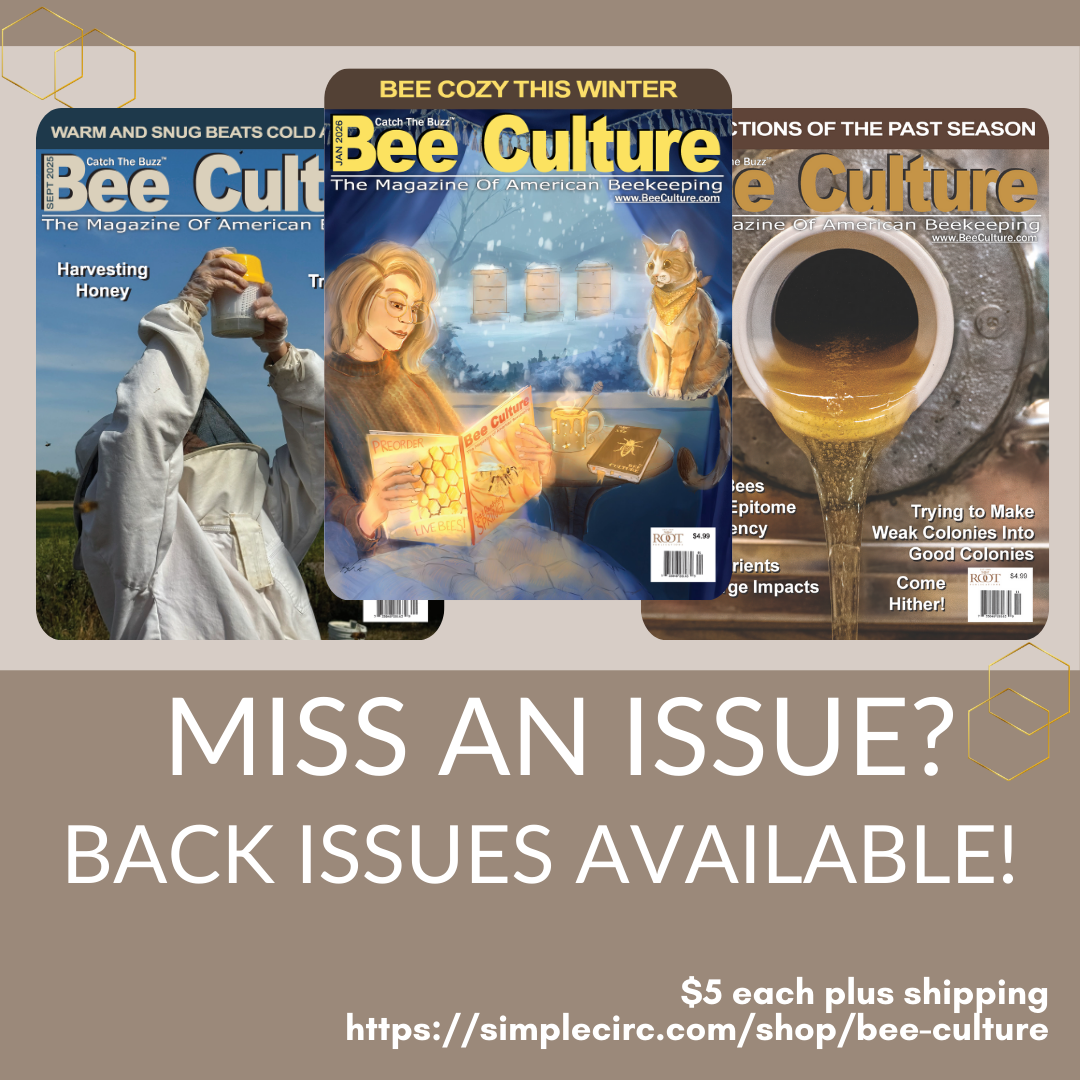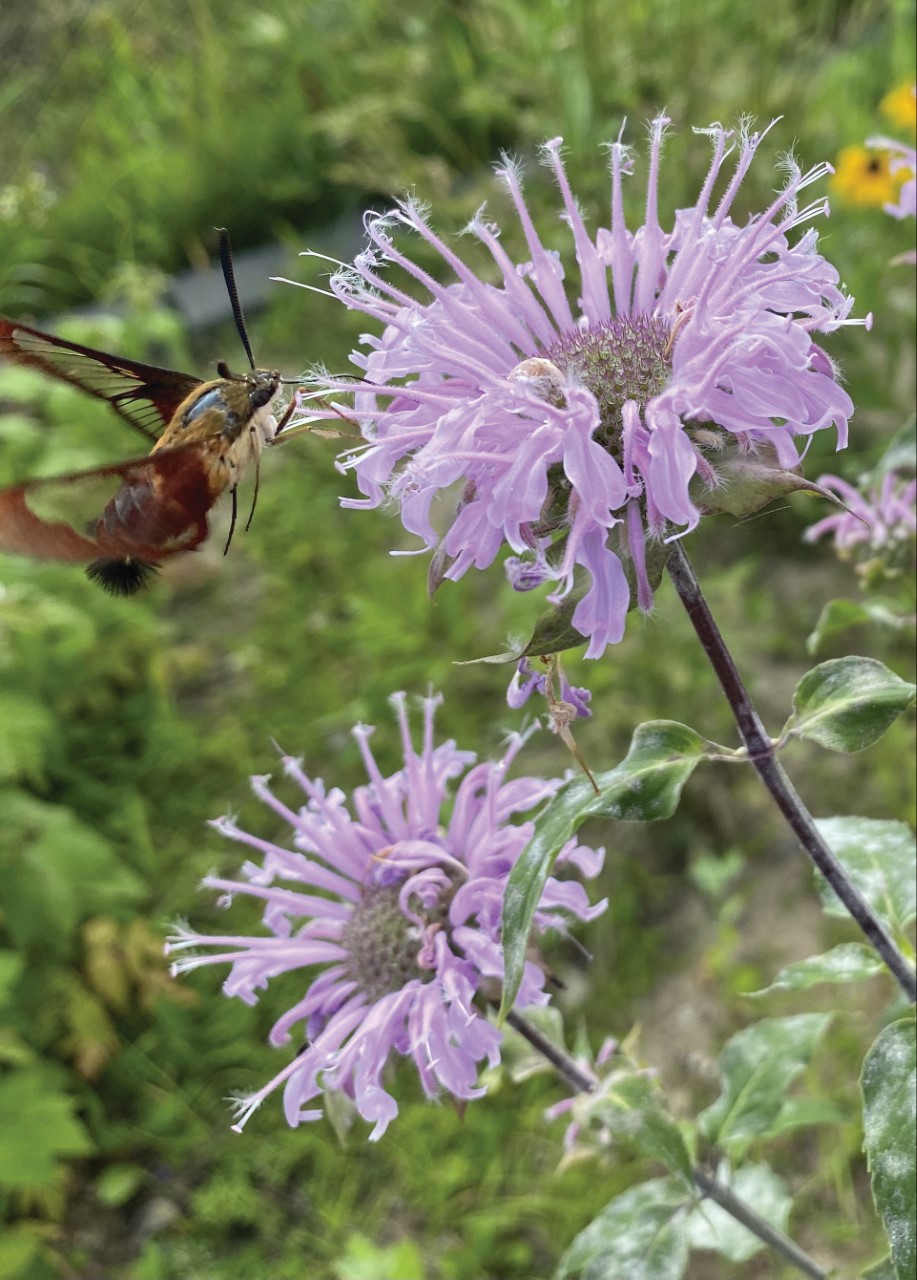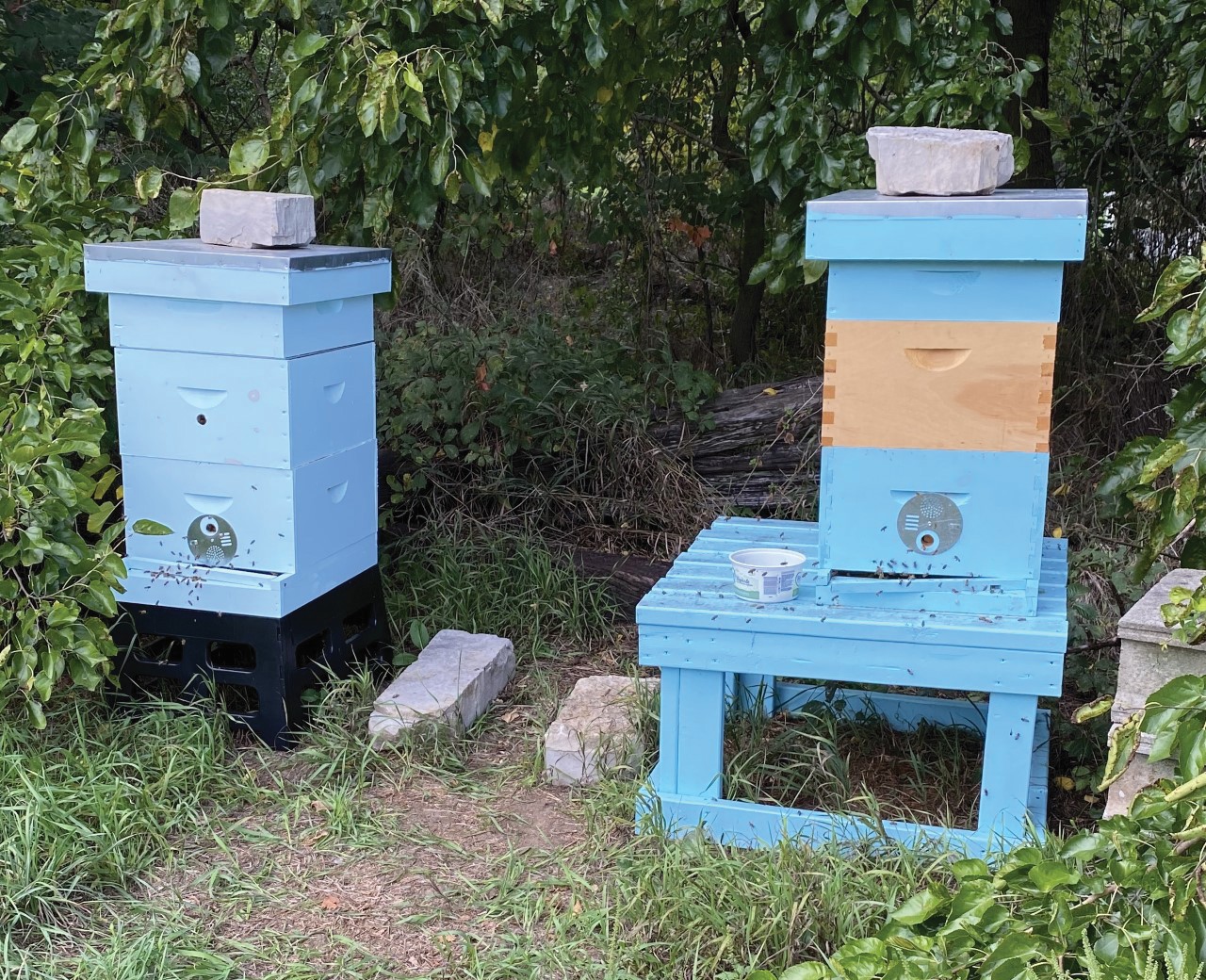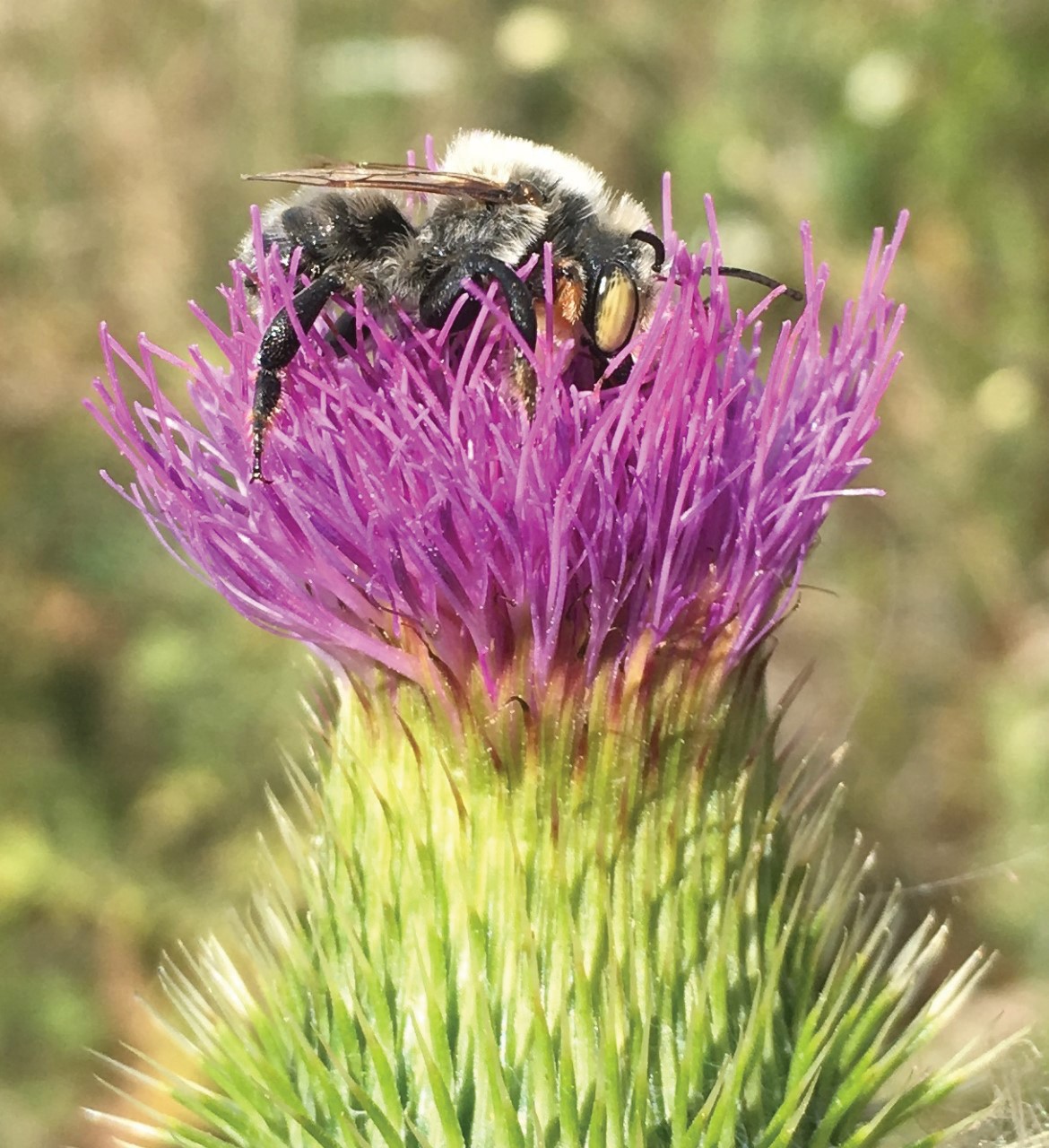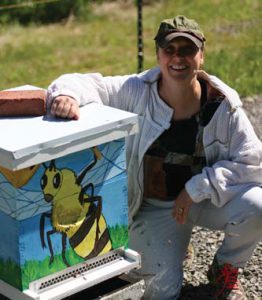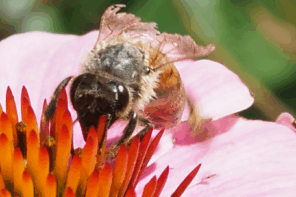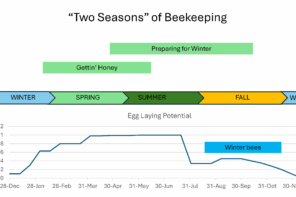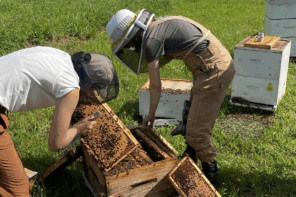An Interview with Dr. Britteny Kyle, DVM, MS
Dr. Tracy Farone
For BC’s interview issue, I sat down (over ZOOM) with Dr. Britteny Kyle, a Canadian veterinarian whom I met in the Fall of 2019 at Apimondia (the World’s bee conference) when it was held in Montreal, Ontario. After hanging out a bit with Britteny at the conference, she introduced me to the Honey Bee Veterinary Consortium (HBVC). An organization, which she served as the president-elect at the time. During our conversation, I asked Dr. Kyle to share her journey as a veterinarian finding her way into the world of honey bees. Now she is truly on a mission to help bees and beekeepers! Here are some questions I posed to her:
1. Describe your journey as a veterinarian in discovering bee medicine.
“I was a small animal vet. I graduated in 2009 and did general practice and emergency. I loved some parts of practice, but it was not 100% the right fit for me.”
After working part-time, moving, and taking time off for three maternity leaves, Dr. Kyle was struggling with the decision to return to general practice or stay home with her kids, when she saw a continuing education course on honey bees for veterinarians. “ I was so excited! I had never considered that vets could work with honey bees!
Growing up I was always out in the garden, and I loved insects,” she explained. “It (honey bee medicine) was a way to find something I was fascinated with and combine it with the aspects of veterinary medicine that I loved. I love the challenges of diagnostics, working with clients, whether cat owners or beekeepers. It felt like the right fit.”
After taking her first continuing education course on honey bees, Dr. Kyle attended the HBVC conference and applied to be an officer on their board. She was soon elected as president-elect, which she discovered was really a “three-year” position, as president-elect moves to president and then past president. Britteny currently serves the HBVC as past president.
Dr. Kyle continued to do whatever she could to learn more about bees. “I took an eight-month beekeeping course and read as much as I could.”
Dr. Kyle considered opening a practice to serve honey bees but in Ontario, Canada, veterinarians are required to work out of an “accredited” hospital, which requires an investment in infrastructure and inventory beyond what she expected to be able to recoup.
Even as a mobile veterinarian, she realized she would still have an incredible amount of overhead and could not afford the cost to attempt to serve perhaps just a few honey bee clients. Telemedicine alone is often used for honey bee visits in Ontario and prescribing antibiotics routinely is common practice.
These realizations led Dr. Kyle down a different path…. “There wasn’t enough evidence for me to safely prescribe prophylactic antibiotics or not. So, I thought if we didn’t have enough evidence, I better go get some! That’s when I started my master’s and now, I’m working on my PhD.”
2. Describe your recent grad school studies and what you are doing now.
Dr. Kyle’s Masters in epidemiology focused on geographical study of AFB cases in Ontario. Dr. Kyle is currently pursuing her PhD in epidemiological studies focusing on American Foulbrood and looking into the proper use and risk of using antibiotics to treat AFB. She is also looking for affordable and effective alternatives in managing AFB for beekeepers. Her mission is definitely underway!
3. Describe the plans and purpose to start a honey bee medicine certification program for veterinarians.
Working with her colleagues at HBVC, Dr. Kyle, helped to develop an idea to provide a veterinary certification program for veterinarians interested in honey bee medicine. This 150 -hour program will be designed to provide a structure and course that will provide the veterinarian with basic competency for working with beekeepers and honey bees.
The development of this new certification program is rooted in an effort to better serve honey bees and address concerns of beekeepers. Dr. Kyle explains…“By attending beekeeping meetings, I heard from a number of people in the industry and beekeepers that there was a real concern that veterinarians did not know what they were talking about with respect to bees, and we (vets) were just going to come in and mess things up. I think that is a valid concern on the beekeeping side but from the vet side , we look at it like… “Do you know how many things we learn in practice that we haven’t seen before?” Veterinarians are accustomed to learning on their feet! But I can understand the lack of trust from beekeepers due to this new relationship. We need to earn it.”
Bees are an animal and much of the principals, knowledge, and skills veterinarians learn in veterinary school can be translated to honey bee medicine, however Dr. Kyle acknowledges that bees are “different” enough to warrant special study, for example how to perform a proper hive inspection.
“ The program is a way to build a bridge to show beekeepers how veterinarians that take additional certification and training are serious, really care, and have taken time to gain knowledge to serve beekeepers and bees.”
4. How do you think veterinarians can best serve honey bees and their beekeepers?
“Personally, I think I can best serve beekeepers to assess disease risk and how to mitigate that risk for their bees…biosecurity is an area where veterinarians can really make an impact in apiculture. I believe antibiotics can be used more judiciously and I would like to bring more awareness to the multiple aspects of treatment decisions.”
“I look at this as a really exciting opportunity to form relationships that haven’t existed before, and I hope that beekeepers can also look at it this way.” Dr. Kyle hopes, “Beekeepers understand that veterinarians who are interested in working with bees really care, are interested, and want to help.”



